We reveal which AFL clubs have the best record since 2010 when matches are decided by a goal or less
The AFL has given fans so many thrilling finishes over the past 10 years, but which clubs have the best record when the game goes down to the wire? We’ve looked at the data and found the answer.
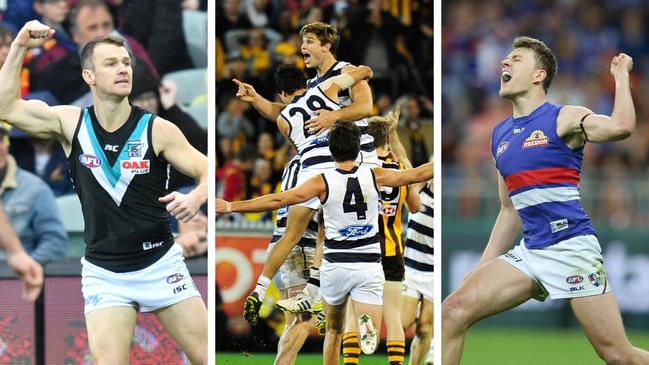
AFL News
Don't miss out on the headlines from AFL News. Followed categories will be added to My News.
- Port China match hit by coronavirus ticket freeze
- How to get the most out of your Advertiser digital subscription
How well does your club perform when the game is on the line?
Most AFL fans have a subjective opinion on the matter, but now we know for sure.
We’ve crunched the numbers to find out which AFL clubs have the best winning record, over the past decade, in games decided by a kick or less.
How does your team fare? Find out below – the results may surprise you.
Adelaide
Played: 23
Won: 10
Lost: 12
Drew: 1
Winning percentage: 43.47%
Biggest rival: Port Adelaide (won 2, lost 2)
The Showdown is one of the AFL’s biggest rivalries so it’s no surprise the Crows have played out their closest games against their cross-town rival Port Adelaide throughout the past decade.
Prior to Christmas, The Advertiser ranked its top 10 encounters of the decade between the sides, with Showdown 35 – which included the infamous ‘Monfries bounce’ – topping the list.
Adelaide also came within a kick against Hawthorn and Carlton twice each over the past 10 years, but lost all four matches.
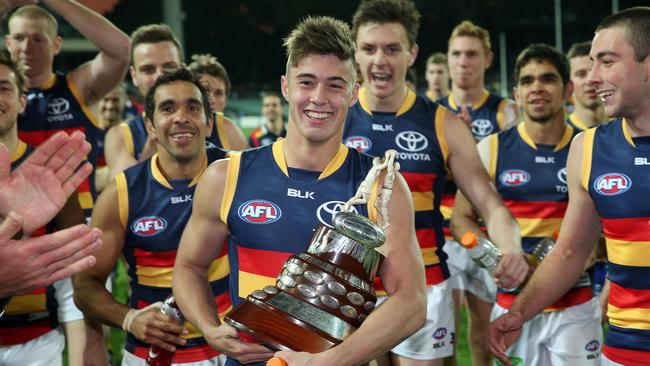
Brisbane
Played: 22
Won: 11
Lost: 11
Drew: 0
Winning percentage: 50%
Biggest rival: Gold Coast (3-1), Adelaide (1-3)
Since Gold Coast entered the competition, the Q Clash between Queensland sides the Suns and Lions has on four occasions well and truly lived up to the hype, with Brisbane coming out on top all but once.
It wasn’t the case in 2019, however, with Brisbane comfortably winning the two encounters by 41 and 91 points, respectively, en route to a second-placed finish in the home and away season.
The Lions’ bogey team in close matches has been Adelaide, but they turned that around last season with a one-point triumph at the Gabba in May – when they ended a four-game Crows winning streak.
Carlton
Played: 30
Won: 12
Lost: 16
Drew: 2
Winning percentage: 40%
Biggest rival: Port Adelaide (3-0), Fremantle (1-2), Essendon (1 loss, two draws)
Wins have been few and far between for the Blues in recent years, but the stats show they’ve been involved in plenty of close finishes during the past decade.
Interestingly, they’ve had a perfect record against South Aussie rival Port Adelaide when matches go down to the wire – the most recent being in 2016 when Matthew Kreuzer kicked Carlton into the lead late in game at then Etihad Stadium, having trailed for most of the contest.
The Blues have also had close games against bitter rival Essendon, without managing a win.
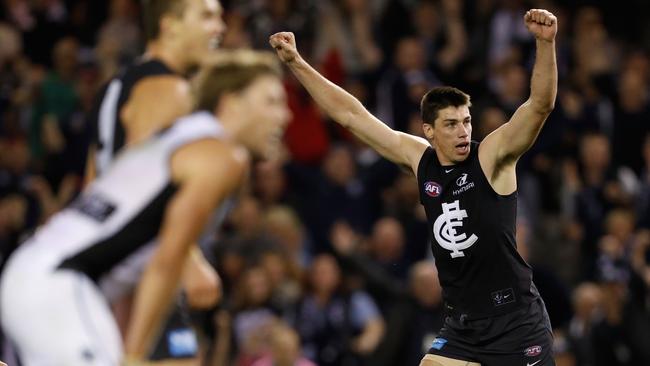
Collingwood
Played: 30
Won: 14
Lost: 13
Drew: 3
Winning percentage: 46.6%
Biggest rival: Hawthorn (1-3)
The Magpies have played in some thrillers during the past decade – none bigger than the drawn grand final against St Kilda in 2010, and the 2018 decider against West Coast where the infamous Dom Sheed kick snatched victory away from them.
As one of the biggest clubs in the competition, it’s fitting that Collingwood has played the most close games against another of the AFL’s giant franchises in Hawthorn – although, its record in those clashes hasn’t been too flash.
The most recent was last year’s Round 16 clash under Friday night lights, where the Pies led most of the night but were overrun by the Hawks in the final term to lose by four points.
Essendon
Played: 31
Won: 15
Lost: 14
Drew: 2
Winning percentage: 48.38%
Biggest rival: Sydney (1-4)
One would think the Bombers’ closest games of the decade would be against their Anzac Day rival Collingwood, but the data shows that’s not the case.
Essendon has had five results against Sydney decided by less than a kick, winning just the one – in Round 20, 2011 when Adam Goodes missed after the siren on the edge of the 50-metre arc.
Remarkably, that victory – by a point – was only one of three occasions where the Bombers beat the Swans in the past decade.
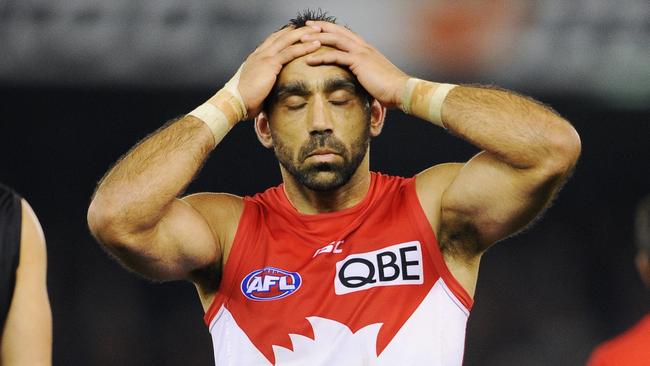
Fremantle
Played: 24
Won: 15
Lost: 8
Drew: 1
Winning percentage: 62.5%
Biggest rival: Carlton (2-2), Geelong (1-2)
For all the Derby hype against cross-town rival West Coast, only one of those clashes in the past 10 years has been decided by less than a kick – in Round 18, 2011 when the Eagles won by a point after Hayden Ballantyne’s kick after the siren hit the post.
Instead, the Dockers have played most of their nailbiters against Carlton and Geelong – the latter they’ve enjoyed an unlikely rivalry with, brought about after knocking the Cats off in finals in 2012 and 2013.
But Fremantle’s closest win over Geelong came in the opening round of 2011, when Matthew Pavlich’s kick out of mid-air saw his team home by four points.
Geelong
Played: 39
Won: 21
Lost: 16
Drew: 2
Winning percentage: 53.84%
Biggest rival: Hawthorn (6-2)
Geelong, with 39 games, played in the most heart-stoppers over the past decade – unsurprisingly, eight of them were against arch rival Hawthorn.
The Cats-Hawks rivalry is considered by many as the biggest in the AFL, and the stats in recent times certainly support that statement.
Geelong had Hawthorn’s number in six of those games, during the years of the infamous ‘Kennett curse’, with Tom Hawkins’ winning kick after the siren in 2012, and Isaac Smith’s miss – also after the buzzer – in the 2016 qualifying final being just two of many memorable finishes for Cats fans.
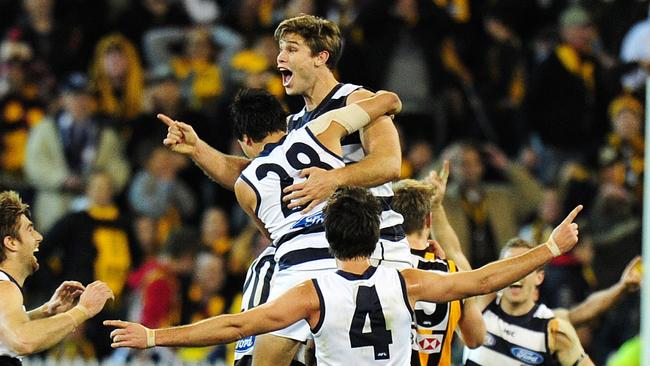
Gold Coast
Played: 20
Won: 9
Lost: 10
Drew: 1
Winning percentage: 45%
Biggest rival: Brisbane (1-3)
As mentioned earlier, the Suns-Lions Q Clash has lived up to the hype on occasions – however, Gold Coast has been on the wrong end of the result more often than not when things get close.
The Suns’ closest triumph over their Queensland rival came on enemy turf at the Gabba in 2018, where they held on in a frantic final two minutes after Tom Lynch had the chance to ice the game, but missed the set-shot to keep the Lions in the hunt.
Gold Coast has a 6-12 record against Brisbane since entering the AFL.
GWS
Played: 19
Won: 10
Lost: 6
Drew: 3
Winning percentage: 52.63%
Biggest rival: Western Bulldogs (2-2)
One of the burgeoning modern day rivalries is certainly GWS and the Western Bulldogs, who share the spoils at two wins each from their four down-to-the-wire finishes.
None of them were more significant than the 2016 preliminary final, where Jack Macrae’s late goal sunk the Giants to propel the Bulldogs into the decider – where they would beat Sydney and end a 62-year premiership drought.
GWS’ finest wins came in 2017 and 2014 – the latter where a Devon Smith long-bomb with 20 seconds on the clock gave his team victory in a 115-109 shootout at Docklands.
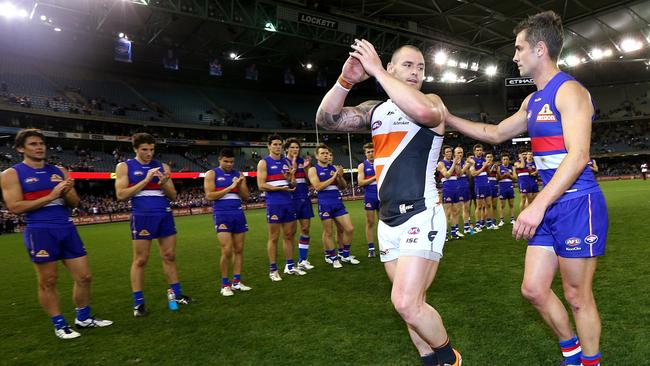
Hawthorn
Played: 38
Won: 23
Lost: 13
Drew: 2
Winning percentage: 60.52%
Biggest rival: Geelong (2-6)
The Hawks have been involved in the second most games decided by under a goal, one below their fierce rival, Geelong.
Yet, nearly half of their losses came against the Cats, mainly in the early 2010s.
Amazingly, five of those 38 results have come in finals, with three wins (Adelaide, Geelong and Port Adelaide in successive preliminary finals).
Melbourne
Played: 28
Won: 12
Lost: 15
Drew: 1
Winning percentage: 42.85%
Biggest rival: Collingwood (1-1-1), North Melbourne (0-3)
Melbourne has suffered mainly against the Kangaroos in games under six points, losing to them on three occasions.
The Demons also lost to Geelong by under a goal twice in one season (2018), but the strangest stat was against Collingwood in 2010.
The sides contested in two games that season, which were decided by a total of one point, with the Pies winning in round two by a point, and then there was a draw in the Queen’s Birthday match.
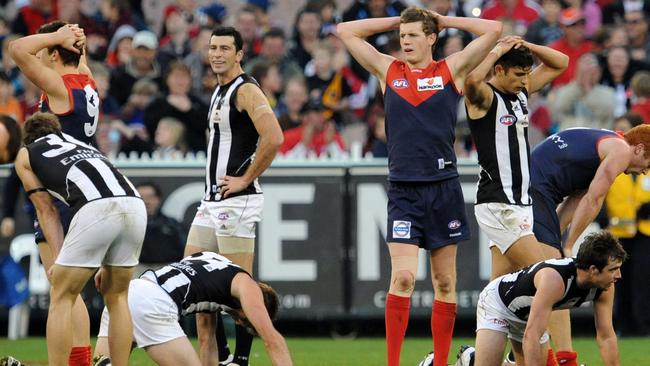
North Melbourne
Played: 29
Won: 9
Lost: 20
Drew: 0
Winning percentage: 31.03%
Biggest rival: Sydney (1-3), Brisbane Lions (2-2)
The Roos are anything but clutch, as they’ve lost the most matches by under a goal in the past decade, and won the second least.
North lost five games by under a goal in both 2013 and 2017, which arguably cost it finals in both campaigns.
North has lost three games to West Coast by under a goal – highlighted by Nic Naitanui’s after the siren heroics in 2013, but has a perfect record against Melbourne.
Port Adelaide
Played: 31
Won: 13
Lost: 17
Drew: 1
Winning percentage: 41.93%
Biggest rival: West Coast (3-2), Adelaide (2-2)
While Port’s record is positive against the Eagles, the West Australians had the last laugh in the 2017 elimination final thanks to Luke Shuey’s after-the-siren goal.
Remarkably, the Power’s record under current coach Ken Hinkley is eight wins and 15 losses – including two finals.
Meanwhile, under Matthew Primus (3-1) and Mark Williams (2-1) it was positive.
The Power also have a 2-2 record against rivals the Adelaide Crows, a perfect record against St Kilda, yet have lost three to Carlton.
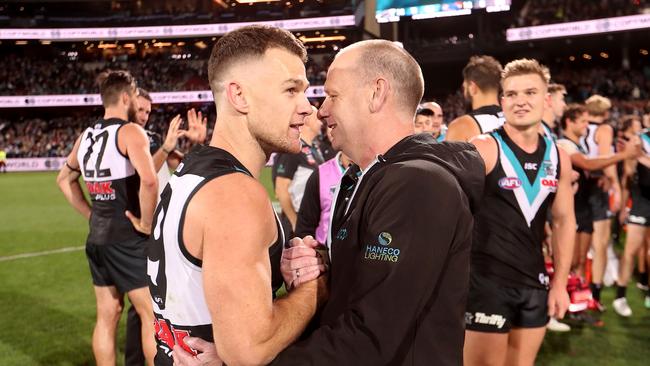
Richmond
Played: 24
Won: 8
Lost: 14
Drew: 2
Winning percentage: 41.93%
Biggest rival: GWS Giants (0-3), Western Bulldogs (1-2), Fremantle (0-3), Sydney (3-0)
Across the past decade, Richmond has celebrated the least wins by under a goal, which shows its rapid rise from resident whipping club to terrifying two-time champions.
In the past two seasons since their drought-breaking flag, the Tigers are 3-1, with the loss coming to GWS in 2018.
Prior to that season, the Tigers’ record was 5-13-2, which includes three successive losses in 2017 to Western Bulldogs, Fremantle and GWS.
St Kilda
Played: 29
Won: 10
Lost: 14
Drew: 5
Winning percentage: 34.48%
Biggest rival: Hawthorn (1-2-1), Geelong (2-1-1)
The Saints love a draw it seems, as they’ve boasted the most non-results in the competition since 2010 – including that year’s grand final.
St Kilda also has a perfect record over the Gold Coast Suns when matches go down to the wire, with two of those wins coming in 2019.
Yet, it has suffered against Port Adelaide, losing three games to the Power by under a goal – in 2012, 2013 and 2017.
Arguably, the Saints’ most memorable win was the 2010 qualifying final against Geelong, where they won a thriller by four points after a controversial late push in the back call on Cat Cameron Mooney against James Gwilt denied Cameron Ling what would have been the matchwinning goal.
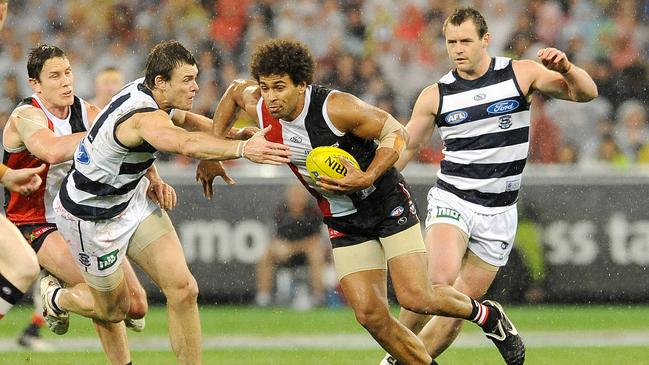
Sydney
Played: 34
Won: 15
Lost: 17
Drew: 2
Winning percentage: 44.11%
Biggest rival: Essendon (4-1), Hawthorn (1-4)
The Swans have been involved in the third most games decided by under a goal, and have won 15 of them.
Sydney has dominated the Bombers with four wins out of five, but struggled against the Hawks, with only one win from five.
Remarkably, the Swans have had just one game against their rivals GWS decided by under a goal – a two-point loss in round 20, 2019.
West Coast
Played: 28
Won: 16
Lost: 11
Drew: 1
Winning percentage: 57.14%
Biggest rival: Port Adelaide (2-3)
The Eagles are really kings of the big game and the big moments, winning a remarkable 16 games from 28 by under a goal.
West Coast had a poor record against Port Adelaide until 2017, when Luke Shuey broke Power hearts and then Jeremy McGovern followed up the year later, also after the siren.
West Coast has North Melbourne’s number, but remarkably, they’ve not been perfect against Gold Coast.
The Eagles have won just one game under a goal against the Suns, losing another and drawing the third.
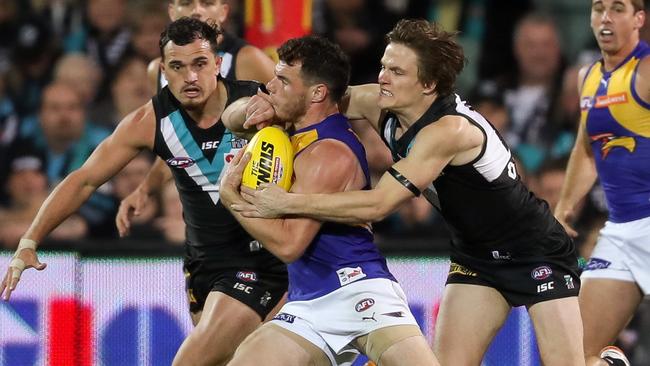
Western Bulldogs
Played: 16
Won: 16
Lost: 9
Drew: 0
Winning percentage: 64%
Biggest rival: GWS (2-2)
There’s no surprise the Bulldogs’ biggest rival is the Giants after the series of thrillers in the late 2010s, highlighted by their preliminary final triumph in 2016.
It was the year for thrilling results for the Dogs as they played in five games decided by under a goal in 2016, losing just once.
The Dogs also have a perfect record over the Swans, winning three games against them by under a goal.
